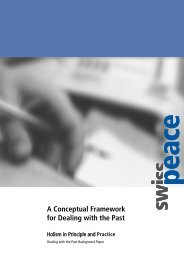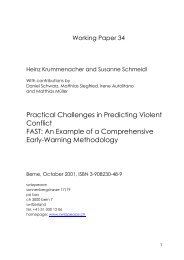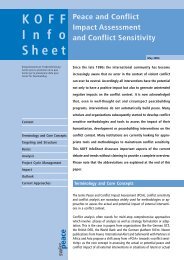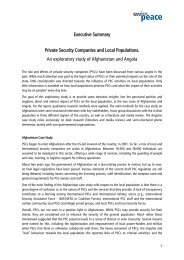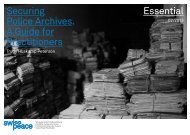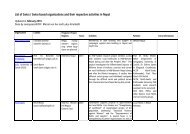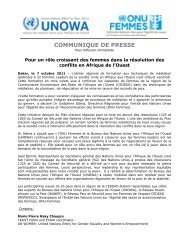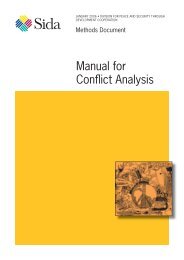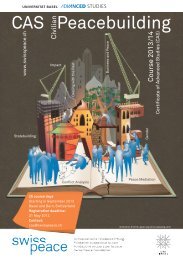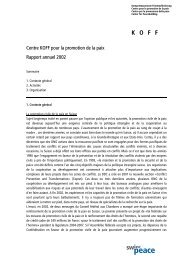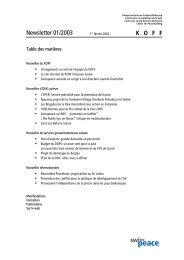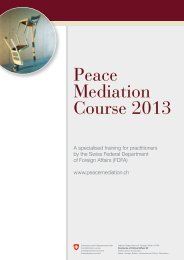Unpacking the Mystery of Mediation in African Peace ... - Swisspeace
Unpacking the Mystery of Mediation in African Peace ... - Swisspeace
Unpacking the Mystery of Mediation in African Peace ... - Swisspeace
You also want an ePaper? Increase the reach of your titles
YUMPU automatically turns print PDFs into web optimized ePapers that Google loves.
<strong>Unpack<strong>in</strong>g</strong> <strong>the</strong> <strong>Mystery</strong> <strong>of</strong> <strong>Mediation</strong> <strong>in</strong> <strong>African</strong> <strong>Peace</strong> Processes<br />
s<strong>in</strong>ce Museveni came to power two decades ago.<br />
Among o<strong>the</strong>rs, <strong>the</strong> GoU commits itself to mak<strong>in</strong>g<br />
<strong>the</strong> central government more <strong>in</strong>clusive, promot<strong>in</strong>g<br />
proportional representation <strong>of</strong> all regions <strong>in</strong><br />
<strong>the</strong> Ugandan army and police, promot<strong>in</strong>g economic<br />
development <strong>in</strong> <strong>the</strong> poorest regions such as<br />
Nor<strong>the</strong>rn Uganda, and respect<strong>in</strong>g <strong>the</strong> land rights<br />
<strong>of</strong> <strong>the</strong> Acholi as well as <strong>the</strong>ir right to participate<br />
<strong>in</strong> democratic processes.<br />
The agreements on reconciliation and accountability<br />
propose different mechanisms <strong>of</strong> transitional<br />
justice that serve different purposes. Local<br />
reconciliation and <strong>the</strong> re<strong>in</strong>tegration <strong>of</strong> LRA fighters<br />
<strong>in</strong> <strong>the</strong>ir communities are achieved through<br />
traditional reconciliation processes, such as mato<br />
oput. A truth commission is created to empower<br />
victims and promote national reconciliation. To<br />
achieve formal legal accountability, <strong>the</strong> most serious<br />
crimes would be prosecuted by a special division<br />
with<strong>in</strong> <strong>the</strong> High Court <strong>of</strong> Uganda – which<br />
would require a change <strong>in</strong> national legislation.<br />
The drafters <strong>of</strong> <strong>the</strong> agreement had two aims: <strong>the</strong>y<br />
sought to satisfy victims and lay <strong>the</strong> basis for<br />
post-conflict reconciliation, while at <strong>the</strong> same<br />
time try<strong>in</strong>g to deactivate <strong>the</strong> ICC’s jurisdiction<br />
via <strong>the</strong> pr<strong>in</strong>ciple <strong>of</strong> complementarity. The result<br />
is a comprehensive and sophisticated transitional<br />
justice framework for Nor<strong>the</strong>rn Uganda.<br />
Participation<br />
Officially, <strong>the</strong> Juba peace talks were facilitated by<br />
<strong>the</strong> GoSS, and its participants were representatives<br />
<strong>of</strong> <strong>the</strong> Ugandan government, on <strong>the</strong> one<br />
side, and <strong>of</strong> a non-state armed group, <strong>the</strong> LRA,<br />
on <strong>the</strong> o<strong>the</strong>r side – which po<strong>in</strong>ts to a classical<br />
track-1 process <strong>of</strong> mediation. However, a variety<br />
<strong>of</strong> Ugandan actors, from <strong>the</strong> government as well<br />
as civil society, <strong>in</strong>tervened, mak<strong>in</strong>g it difficult to<br />
clearly classify <strong>the</strong> Juba talks. Fur<strong>the</strong>rmore, due to<br />
<strong>the</strong> ICC <strong>in</strong>dictments and lack <strong>of</strong> security guarantees<br />
for <strong>the</strong> top leadership <strong>of</strong> <strong>the</strong> LRA, <strong>the</strong> LRA<br />
delegation did not consist <strong>of</strong> <strong>the</strong> top decisionmakers<br />
<strong>of</strong> <strong>the</strong> movement, necessitat<strong>in</strong>g frequent<br />
check-backs and visits to <strong>the</strong> bush.<br />
Third-Party Coord<strong>in</strong>ation and “Forum-<br />
Shopp<strong>in</strong>g”<br />
Towards <strong>the</strong> end <strong>of</strong> 2006, <strong>the</strong> LRA and Pax<br />
Christi voiced dissatisfaction about <strong>the</strong> Juba talks.<br />
64<br />
They wanted to give priority to ICC-related issues,<br />
as opposed to <strong>the</strong> Acholi parliamentarians,<br />
who were <strong>in</strong>terested <strong>in</strong> <strong>the</strong> bigger political questions<br />
concern<strong>in</strong>g Nor<strong>the</strong>rn Uganda. The LRA<br />
also accused Riek Machar <strong>of</strong> be<strong>in</strong>g biased <strong>in</strong> favor<br />
<strong>of</strong> <strong>the</strong> GoU. 171 Consequently, <strong>the</strong> LRA and Pax<br />
Christi went to look for an alternative mediator<br />
and forum for negotiations. Thus, several prelim<strong>in</strong>ary<br />
meet<strong>in</strong>gs were held <strong>in</strong> neighbor<strong>in</strong>g<br />
countries, most importantly <strong>in</strong> Mombasa, Kenya.<br />
The <strong>in</strong>tervention <strong>of</strong> UN Special Envoy Chissano,<br />
appo<strong>in</strong>ted <strong>in</strong> December 2006, was required to<br />
consolidate <strong>the</strong> Juba talks. His <strong>in</strong>volvement was<br />
both a bless<strong>in</strong>g and a curse for <strong>the</strong> <strong>in</strong>itial mediator,<br />
Riek Machar. It was a bless<strong>in</strong>g because Chissano’s<br />
commitment to <strong>the</strong> GoSS <strong>in</strong>itiative <strong>in</strong>validated<br />
o<strong>the</strong>r mediation processes and def<strong>in</strong>itely<br />
brought <strong>the</strong> talks back to Juba <strong>in</strong> spr<strong>in</strong>g 2007. It<br />
was also a curse <strong>in</strong> <strong>the</strong> sense that it deprived<br />
Machar <strong>of</strong> full control <strong>of</strong> <strong>the</strong> process. For example,<br />
Chissano imposed five regional ambassadors<br />
as facilitators <strong>of</strong> <strong>the</strong> Juba talks, which marg<strong>in</strong>alized<br />
<strong>the</strong> <strong>in</strong>itial support team.<br />
The Role <strong>of</strong> <strong>the</strong> ICC <strong>in</strong> <strong>the</strong> Juba talks<br />
The ICC got <strong>in</strong>volved <strong>in</strong> Nor<strong>the</strong>rn Uganda when<br />
President Museveni referred <strong>the</strong> situation concern<strong>in</strong>g<br />
<strong>the</strong> LRA to <strong>the</strong> ICC Prosecutor <strong>in</strong> December<br />
2003. At <strong>the</strong> time, Museveni planned to<br />
step up <strong>the</strong> military campaign aga<strong>in</strong>st <strong>the</strong> LRA,<br />
and <strong>the</strong> ICC was useful <strong>in</strong> this context, stigmatiz<strong>in</strong>g<br />
<strong>the</strong> LRA <strong>in</strong>ternationally and enhanc<strong>in</strong>g <strong>the</strong><br />
legitimacy <strong>of</strong> UPDF military action. Subsequently,<br />
<strong>the</strong> ICC started <strong>in</strong>vestigations and <strong>in</strong><br />
July 2005 issued arrest warrants aga<strong>in</strong>st five LRA<br />
leaders <strong>in</strong>clud<strong>in</strong>g Kony and Otti. In 2006, as<br />
mentioned above, Museveni’s strategy for deal<strong>in</strong>g<br />
with <strong>the</strong> LRA shifted from war to peace-mak<strong>in</strong>g,<br />
and <strong>the</strong> role <strong>of</strong> <strong>the</strong> ICC changed <strong>in</strong> this context.<br />
172<br />
From <strong>the</strong> start <strong>of</strong> <strong>the</strong> peace process, <strong>the</strong> ICC was<br />
an important actor. It is important to mention<br />
171 Schomerus, Mareike: “The Lord’s Resistance Army <strong>in</strong> Sudan: A<br />
History and Overview”, Geneva: Small Arms Survey (September<br />
2007), pp. 34-40.<br />
172 For an overview <strong>of</strong> arguments see Lanz, David: “The ICC’s Intervention<br />
<strong>in</strong> Nor<strong>the</strong>rn Uganda: Beyond <strong>the</strong> Simplicity <strong>of</strong> <strong>Peace</strong><br />
vs. Justice”, Work<strong>in</strong>g Paper, The Fletcher School <strong>of</strong> Law and<br />
Diplomacy (May 2007), (http://www.reliefweb.<strong>in</strong>t/rw/<br />
rwb.nsf/db900sid/PANA-78VKGJ?OpenDocument).




